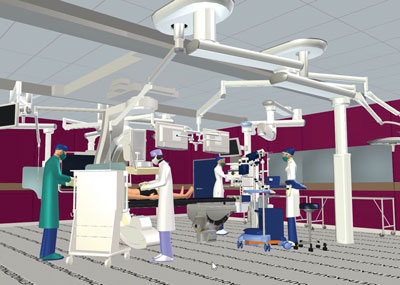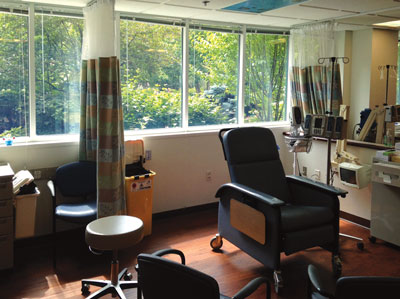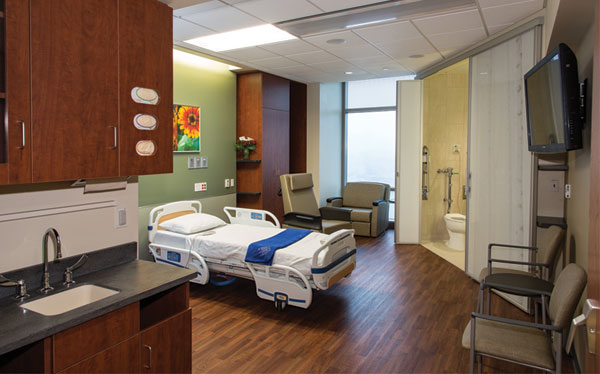Diagnosing new innovations
Health care providers bring medical advances to Fox Valley
Advances in medicine are happening every day and making an impact around the world. Changes in health care in the Fox Valley are no exception. Affinity Health System, ThedaCare and Aurora Health Care are all contributing to the evolution locally.
Affinity Health System
On Jan. 10, a new chapter in care at St. Elizabeth hospital in Appleton became a reality when patients were welcomed into rooms at Fremont Tower, a five-story building with 90 private patient rooms. The renovations came at a cost of $95 million, which includes new radiology facilities and other improvements.
The construction project was phase IV of a master plan that was created in 2006 for the hospital, which was founded in 1899.
“Our goal was to take that chemical, sterile feel out of our hospital,” says Heather Schimmers, vice president of Patient Care Services at St. Elizabeth Hospital. “The greatest thing that I’m most proud of is sure we had architects, but they didn’t design it (Fremont Tower). It was our associates and our 700-plus patients.”
The concept for the tower came about six years ago and the design process started three years ago.
Features of the patient rooms include a large window to let in natural sunlight; limited flat services to prevent the spread of bacteria; outlets for charging devices; a chair that converts into a bed for guests; a wardrobe with a safe and a bathroom with a walk-in shower that is easily accessible for both patients, and a care team member if needed, with a sliding door featuring a tree design — every third room has a different design.
Patients also can control their lights, window shades, TV and music at their bedside. TV options include movies to order, patient logging for procedures, a relaxation channel and ability to order meals from the Marketplace.
In order to reduce patient disturbance and streamline medicine and supply procedures, bins are restocked for each room via outside access. Each patient floor offers a small waiting room with a couch, TV, table and chairs, and convenience stations as well.
“Our rationale for that is we want to bring the family to the rooms,” says Schimmers referring to the size of the space.
Noise also has been reduced inside Fremont Tower with sound-absorbing walls. Each floor and patient room was designed the same to help make care more efficient. There are three sections or “neighborhoods” to each floor. Double doors divide each hallway within the neighborhood and can be closed off if needed to prevent the spread of a disease or in an emergency situation.
Fremont Tower also offers two spirituality rooms in addition to the chapel for “when you just need to take a minute and gather your thoughts,” Schimmers adds.
Last, but not least, Fremont Tower also is gaining attention for its menu offerings in its new cafeteria space, the Marketplace.

The Marketplace, located in The Fremont Tower at St. Elizabeth Hospital
Photo courtesy of Affinity Health System
“I don’t know that you can go to any other restaurant for lunch in the area that is as good as this with this variety,” shares Schimmers.
The Marketplace is open to the public, in addition to patients, family and friends, for breakfast, lunch and dinner at a reasonable price. St. Elizabeth works with Riverview Gardens to get produce for use in its offerings. The space also makes use of large windows to maximize sunlight and limit the use for additional lighting.
Off the Marketplace, visitors will be welcome to enjoy the courtyard in the warmer months. This space is currently under construction, but will feature gardens, a water feature and seating.
“The Fremont Tower at St. Elizabeth Hospital was designed with sustainability in mind, and uses less energy and water than most hospital buildings its size,” says Monica Hilt, president for St. Elizabeth Hospital and regional vice president for Ministry Health Care’s Eastern Region. “It has green roofs, efficient mechanical systems, and uses passive solar energy. This saves money and also helps us be good stewards of our natural resources, which reflects our organizational values of wisdom and reverence.”
Hilt, who is no stranger to Ministry Health Care after joining the system in 1991, was named to her new post on Jan. 11. St. Elizabeth Hospital is part of Affinity Health System, which joined Ministry Health Care in 2012.
“I was originally attracted to Ministry because of its mission and values, and 24 years later, it is the mission and values which continue to energize and inspire me,” Hilt shares. “Our mission as a Catholic health care system is to further the healing ministry of Jesus by continually improving the health and well-being of all people, especially the poor, in the communities we serve.”
Hilt is looking forward to continuing her part in “a high-quality, award-winning organization.”
“We have outstanding safety, quality and patient experience results,” she says. “In my first 30 days, we opened a new five-story building at St. Elizabeth Hospital and were recognized by the state surveyors for our trauma program. It’s exciting, and I look forward to working with our associates, clinicians and community partners to continue serving the people of Northeast Wisconsin.”
ThedaCare
ThedaCare is transforming cancer care.
“Our ThedaCare Regional Cancer Center, opening in 2016 demonstrates that commitment to respecting individuals with cancer and their families,” says Stacy Milam, director of Cancer Services. “The center will serve as the home base for the ThedaCare premier cancer program, with a team of top-talent care providers and offering a broad range of treatments, services and resources, including access to the latest technologies and promising new treatments through participation in clinical trials. Integrating cancer services at one location makes it easier for patients to maintain their daily routines and family life while going through treatment. Hundreds of thousands of people will now have access to the best cancer care north of Milwaukee in one location.”

The addition of a new high-tech, hybrid surgical suite at Appleton Medical Center is slated to be open in September.
Image courtesy of ThedaCare
Prior to breaking ground on the $44 million project in February, ThedaCare met with individuals affected by cancer — patients, friends, family and physicians.
“We talked about how we could help them — physically, mentally, spiritually,” says Milam. “With those insights, we pulled together our wonderful team of specialists and cancer program leaders to create a facility that would be the home base to our premier program and address their needs.”
That home base will be located on Capitol Drive in Appleton, near Encircle Health.
The Regional Cancer Center will eliminate patients from bouncing from specialist to specialist for care.
“Because patients are at the table with us, connected to the right team for their wants and needs, they can choose the practical solutions they want, the ones that respect their quality of life and give them personal peace,” adds Milam. “Whether patients need chemotherapy, radiation, surgery or have a blood disorder, top-talent specialists are working on their care. The clinical care team also includes experts at Mayo Clinic via electronic consults, specialized nurses, experts in medications, palliative care specialists and hospice providers. We participate in clinical trials and research, so patients have even more treatment options.”
It is ThedaCare’s philosophy to care for not only a patient’s body, but also their heart and mind, along with their loved ones.
“We offer many resources, services and therapies to promote healing and help patients feel better, including emotional support and encouragement in both individual and group settings, pastoral care, stress reduction techniques like yoga, creative therapies including music and exercise, massage, financial counseling, connections to community resources and survivorship care,” says Milam. “Patients and families also find hope and healing in our cosmetology services, genetic testing and analysis, nutritional guidance and physical therapy.”
Milam hopes ThedaCare’s offerings will be sought out as a resource.
“We hope that ThedaCare Regional Cancer Center is the place where people with cancer will go with confidence, knowing they are part of a team with their best interests, and those of their friends and families, in mind.”
Another ThedaCare endeavor looking to increase patient’s peace of mind is the addition of a new high-tech, hybrid surgical suite at Appleton Medical Center. The suite is currently under construction and slated to be open in September.
The suite will be used for vascular surgery, interventional cardiology and cardiac surgery.
“Sometimes a patient may need teams from both traditional surgery and the cardiac catheterization lab,” says Bill Boyd, director of Perioperative Services Value Stream. “The hybrid approach means that we’ll be able to address each of the patient’s needs during one session with all the necessary leading edge surgery, imaging and interventional equipment in one place,” says Boyd.
Some procedures are more advanced than what ThedaCare can currently offer.
“It will allow us to do things that we can’t do now,” adds Boyd. “For those patients who need it, it’s going to be of benefit.”
The suite will allow patients to have access to advanced technology, limit multiple visits and anesthesia, and offer less invasive procedures. There also are advantages in terms of costs and getting back to life faster.
“When you look at the aging population, they’re carrying six or seven decades of life,” says Dr. Alex Tretinyak, a vascular surgeon with Fox Valley Surgical Associates. “The patient who will really benefit from this are ones who really only had open surgery before.”
Previously, Tretinyak, who works with ThedaCare through Fox Valley Surgical Associates, would have to turn patients away due to age and other risk factors, but now the hybrid surgery suite is opening new doors. Boyd adds that not every case, however, will be cut out for this.
“In the old days, if the only option you could offer patients was a big, risky surgery, you didn’t offer that surgery,” Tretinyak says.
In some ways, the advancement is a one-stop shop. If doctors get into a procedure or surgery and realize it may need to go another direction, they don’t have to stop and spread out procedures over days or weeks.
“It’s less in and out of the hospital and fewer procedures,” says Tretinyak. “It’s technology that’s great to have in the valley.”
Aurora Health Care
After opening in mid-January, the Lung Multidisciplinary Cancer Clinic (MDCC) at the Vince Lombardi Cancer Clinic at Aurora Medical Center in Oshkosh has taken a new approach to treating thoracic cancers — including lung cancer. The Oshkosh MDCC follows guidelines set forth by the National Comprehensive Cancer Network.

Lung Multidisciplinary Cancer Clinic (MDCC) at the Vince Lombardi Cancer Clinic at Aurora Medical Center in Oshkosh
“It was good, but it’s even better if we can get all these specialists together,” says Dr. Shamsuddin Virani, a medical oncologist who recently joined the Aurora team, of former options.
This approach includes everyone who would be involved with a patient’s care conferring with one another and the opportunity to create a unified patient-centered plan focused on comprehensive, coordinated care. It also allows patients to see members of their team within a shorter period of time — typically within the same day — and in one place with one appointment. This could include a medical oncologist, radiation oncologist, surgeon, interventional pulmonologist, pathologist, interventional radiologist and other specialists.
“Cancer can be a real overwhelming diagnosis,” says Virani. “This is a way to convene all the specialists in one place.”
A cancer nurse navigator also is a key part of the process and provides support, advocacy and education based on individual patient needs.
“They’re like your tour guide, they hold your hand through the whole process,” Virani notes.
The multidisciplinary cancer clinic concept works across other cancer disciplines as well. Extended services are offered in Fond du Lac.
“Although Aurora is pioneering this concept in the area, it is a global concept,” Virani shares. “I see it’s going to be a standard of care concept as it goes down the line. … It’s here to stay.”
According to the American Cancer Society, small cell and non-small cell lung cancer is the second most common cancer in both men and women, not counting skin cancer. “It also accounts for about 27 percent of all cancer deaths and is by far the leading cause of cancer deaths among both men and women. Each year, more people die of lung cancer than of colon, breast and prostate cancers combined,” the society states.
For these reasons, Virani recommends adults ages 55-80 who fit certain criteria participate in an annual screening, which is Medicare approved, and involves a low-dose CT scan to determine if someone has lung cancer.
“This is to detect cancer early before you have any signs or symptoms,” says Virani.
Another initiative on the horizon for Aurora Health Care is primary care redesign. This concept is already underway and is expected to be complete by the end of summer 2015. All Aurora practices will undergo this transition and implement the new approach, according to Laura Spurr, director of medical group operations.
Designed by Aurora, the initiative aims to aid practices in shifting from a volume-based care model to emphasizing patient-centric care, Spurr explains.
“The goal of the initiative is to make it easier for our patients to live well by accessing the care they need, when they need it, with an increased focus on wellness and prevention,” she says. A greater emphasis will be placed on matching patient needs with the right person and skill set.
According to Spurr, the goals of this new concept are to: “help patients live well by providing high-quality care; improve patient experience by providing ongoing guidance to the right care at the right time; improve patient access to meet patients’ needs; enhance engagement through top of license, team-based care; and instill a culture of sustainable, self-improving operational excellence.”
Moving to this model will benefit all Aurora patients, Spurr says.
“Getting an appointment without waiting is a high priority for everyone,” she adds. “By streamlining our practices using LEAN design techniques, patients should experience shorter waiting times. Improved care coordination between clinics and the hospital will result in better outcomes for patients and easier navigation of the healthcare system for those who need it.”
—FC











Leave a Comment